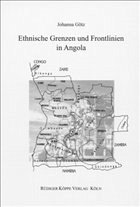Nicht lieferbar

Ethnische Grenzen und Frontlinien in Angola
Versandkostenfrei!
Nicht lieferbar
Die vorliegende Studie zur Geschichte des angolanischen Befreiungs- und anschließenden Bürgerkrieges seit 1961 befaßt sich in erster Linie mit drei Faktoren, die, trotz internationaler Friedensbemühungen, zur kontinuierlichen Fortführung des Konfliktes beigetragen haben: Ethnizität, Nationalismus und Internationalisierung. Entgegen der häufigen Darstellung des Konfliktes als internationaler Stellvertreterkrieg, die sich auf die Zeiten des Kalten Krieges bezieht, weist hier die Autorin auf die Rolle der involvierten Staaten seit Beendigung dieser Ära hin. Die weiterhin internationale Di...
Die vorliegende Studie zur Geschichte des angolanischen Befreiungs- und anschließenden Bürgerkrieges seit 1961 befaßt sich in erster Linie mit drei Faktoren, die, trotz internationaler Friedensbemühungen, zur kontinuierlichen Fortführung des Konfliktes beigetragen haben: Ethnizität, Nationalismus und Internationalisierung. Entgegen der häufigen Darstellung des Konfliktes als internationaler Stellvertreterkrieg, die sich auf die Zeiten des Kalten Krieges bezieht, weist hier die Autorin auf die Rolle der involvierten Staaten seit Beendigung dieser Ära hin. Die weiterhin internationale Dimension des Konfliktes zeigt sich in der wichtigen Stellung der Rohstoffexporteure und Waffenlieferanten der Weltmächte.
Die Untersuchungen der möglichen Faktoren für eine Ethnisierung der Situation führen zu dem Ergebnis, daß es sich im angolanischen Beispiel um eine "politisierte Ethnizität" handelt. Ethnische, geographische und regionale Zugehörigkeit bestimmen die Parteizugehörigkeit und werden von den politischen Führern im Wettkampf um den Zugang zu Ressourcen instrumentalisiert. Die Studie zeigt auf, daß Ethnizität als Motor zur Mobilisierung der ethnischen Gruppen, welchen die Teilnahme an der Ausschöpfung der landeseigenen Ressourcen bislang verwehrt wurde, mißbraucht wird.
Die hier dargestellten Ausführungen sind besonders für ethnologisch und politisch interessierte Leser auf dem Felde der Konflikt- und Friedensforschung von Bedeutung. Eine chronologische Darstellung im Anhang des Werkes gibt einen informativen Überblick über die neuere politische und Wirtschaftsgeschichte der Republik Angola.
The present study on the history of the Angolan war of independence since 1961 focuses primarily on three factors that have contributed to the persistence of the conflict, despite international pressure for peace: ethnicity, nationalism and internationalization. Contrary to the usual characterization of the conflict as an international war by proxy drawn from the cold war period, the author stresses the role of the involved countries since the demise of this era. The continuing international involvement in this conflict is readily apparent by the important position occupied by the arms suppliers and mining companies of the interested countries.
The discussion of possible factors for the ethnification of Angolan society arrives at the conclusion that the Angolan example represents a case of "politicized ethnicity". Party loyalties are determined by ethnic, geographic and regional affiliations and are instrumentalized by the political leadership in their struggle to obtain access to the natural resources. Ethnicity in this context becomes abused as the vehicle to mobilize the different ethnic groups which hitherto have been denied participation in the use of the resources of the land.
The results contained in this book are especially valuable for readers in the fields of conflict and peace research which are also interested in anthropological and political aspects. The appendices provide a chronological overview of the recent political and economic history of Angola.
Die Untersuchungen der möglichen Faktoren für eine Ethnisierung der Situation führen zu dem Ergebnis, daß es sich im angolanischen Beispiel um eine "politisierte Ethnizität" handelt. Ethnische, geographische und regionale Zugehörigkeit bestimmen die Parteizugehörigkeit und werden von den politischen Führern im Wettkampf um den Zugang zu Ressourcen instrumentalisiert. Die Studie zeigt auf, daß Ethnizität als Motor zur Mobilisierung der ethnischen Gruppen, welchen die Teilnahme an der Ausschöpfung der landeseigenen Ressourcen bislang verwehrt wurde, mißbraucht wird.
Die hier dargestellten Ausführungen sind besonders für ethnologisch und politisch interessierte Leser auf dem Felde der Konflikt- und Friedensforschung von Bedeutung. Eine chronologische Darstellung im Anhang des Werkes gibt einen informativen Überblick über die neuere politische und Wirtschaftsgeschichte der Republik Angola.
The present study on the history of the Angolan war of independence since 1961 focuses primarily on three factors that have contributed to the persistence of the conflict, despite international pressure for peace: ethnicity, nationalism and internationalization. Contrary to the usual characterization of the conflict as an international war by proxy drawn from the cold war period, the author stresses the role of the involved countries since the demise of this era. The continuing international involvement in this conflict is readily apparent by the important position occupied by the arms suppliers and mining companies of the interested countries.
The discussion of possible factors for the ethnification of Angolan society arrives at the conclusion that the Angolan example represents a case of "politicized ethnicity". Party loyalties are determined by ethnic, geographic and regional affiliations and are instrumentalized by the political leadership in their struggle to obtain access to the natural resources. Ethnicity in this context becomes abused as the vehicle to mobilize the different ethnic groups which hitherto have been denied participation in the use of the resources of the land.
The results contained in this book are especially valuable for readers in the fields of conflict and peace research which are also interested in anthropological and political aspects. The appendices provide a chronological overview of the recent political and economic history of Angola.



